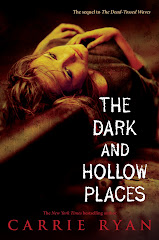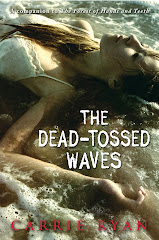Sunday, February 11, 2007
Get 'er done!
Ok, I hope Miri doesn't mind that I'm totally quoting from her blog, but this really stuck with me. She talks about having a conversation with her mother where they were joking about writing and blogging and her mother ended up commenting that:
"People who don't finish books don't sell books."
You can't get much truer than that! You cannot, in fact, sell a book without finishing it.*
This is something that I was discussing on one of my loops this past week. I belong to a group that checks in weekly with writing goals and accomplishments. Last week, someone checked in having written nothing, but spent a lot of time plotting, filling out note cards, etc. Thus began a discussion on what "counts" as writing, which was really fantastic.
On the one hand, what matters in the end is that you have to finish a book to sell the book (or send it to print, you get what I mean). On the other hand, there's often critical planning and thinking that goes into writing that book. So I think the big question is, at what point are you spending too much time in the planning stage and need to jump into the writing stage?
As we all know, I'm prone towards procrastinating (hence the title of this blog). And I think the easiest way to procrastinate is to read craft articles and "think" about my WIP because then I feel like I'm accomplishing something. But I'm not writing. I'm not adding to pages that I can one day sent to an agent.
So where to draw the line between thinking and writing? Between planning and procrastinating?
First, I think everyone's line is in a different place. That disclaimer aside, here's how I approach it: like a lawyer (how sad is that?). If I'd bill a client for the work, then it counts. So drafting, editing, outlining - all that counts (and would get billed). The grey area is in the thinking and pondering. If I'm actively thinking of words, phrasing, plot points, writing out an arranging note cards - that counts in my book as well (and I'd bill it). But if I'm just idly daydreaming, waking up at 3am stressing about it, or just have it on the back-burner, then I don't count it (and wouldn't bill for it).
Because at the end of the day my client (ie: agent or editor) wants something tangible in their hands. They need pages. So while I may count drafting and thinking and plotting, all that matters is the final product. After all, that's what I really get paid for (or hope to get paid for) be it as an attorney or a writer.
I think the bottom line is that we all have to give ourselves credit for the non-writing stuff that we put into our WIPs. We should be proud of that work. But we also need to be careful that we don't use that work as a crutch and that we are very aware that in the end, as Miri's mother said, "People who don't finish books don't sell books."
To that end, daydream away! But make sure that you have some pages to back those daydreams up. What do y'all think of the balance between writing and thinking? What do you count as a productive day?
___________
* sure, you can contract a book with a proposal but still, in the end, you gotta have the whole book to complete the sale.
"People who don't finish books don't sell books."
You can't get much truer than that! You cannot, in fact, sell a book without finishing it.*
This is something that I was discussing on one of my loops this past week. I belong to a group that checks in weekly with writing goals and accomplishments. Last week, someone checked in having written nothing, but spent a lot of time plotting, filling out note cards, etc. Thus began a discussion on what "counts" as writing, which was really fantastic.
On the one hand, what matters in the end is that you have to finish a book to sell the book (or send it to print, you get what I mean). On the other hand, there's often critical planning and thinking that goes into writing that book. So I think the big question is, at what point are you spending too much time in the planning stage and need to jump into the writing stage?
As we all know, I'm prone towards procrastinating (hence the title of this blog). And I think the easiest way to procrastinate is to read craft articles and "think" about my WIP because then I feel like I'm accomplishing something. But I'm not writing. I'm not adding to pages that I can one day sent to an agent.
So where to draw the line between thinking and writing? Between planning and procrastinating?
First, I think everyone's line is in a different place. That disclaimer aside, here's how I approach it: like a lawyer (how sad is that?). If I'd bill a client for the work, then it counts. So drafting, editing, outlining - all that counts (and would get billed). The grey area is in the thinking and pondering. If I'm actively thinking of words, phrasing, plot points, writing out an arranging note cards - that counts in my book as well (and I'd bill it). But if I'm just idly daydreaming, waking up at 3am stressing about it, or just have it on the back-burner, then I don't count it (and wouldn't bill for it).
Because at the end of the day my client (ie: agent or editor) wants something tangible in their hands. They need pages. So while I may count drafting and thinking and plotting, all that matters is the final product. After all, that's what I really get paid for (or hope to get paid for) be it as an attorney or a writer.
I think the bottom line is that we all have to give ourselves credit for the non-writing stuff that we put into our WIPs. We should be proud of that work. But we also need to be careful that we don't use that work as a crutch and that we are very aware that in the end, as Miri's mother said, "People who don't finish books don't sell books."
To that end, daydream away! But make sure that you have some pages to back those daydreams up. What do y'all think of the balance between writing and thinking? What do you count as a productive day?
___________
* sure, you can contract a book with a proposal but still, in the end, you gotta have the whole book to complete the sale.
Subscribe to:
Post Comments (Atom)
















2 comments:
I write every day. If I need thinking and plotting time, I work on writing something else until I'm ready to really write the other project.
If I need it done, anyway, then I just shove it out. I can fix it later. :-)
But that's only me! DSDF!
Wow! My mother's comment sparked a really nice post, apparently. (Still flattered.)
For me, a "productive day" is one where either I wrote prose that I'm proud of or I feel like I could sit down tomorrow and write prose that I'm proud of. (All this from the perspective of someone who has numerous church bulletins with scrawled plotting notes...) In the end, if you want to impress anyone but yourself, you do have to have pages, but I think that thought needs to have gone into those pages. Confused? So am I, don't worry.
It comes down to the individual and his or her goals. For me, I want a book. Thoughts that go into that book are great. Pages, if I've thought about them enough to be proud of them, are even better.
Post a Comment